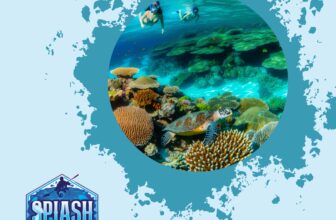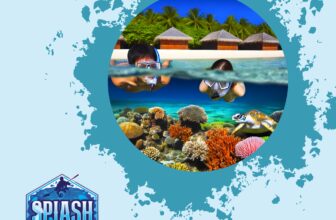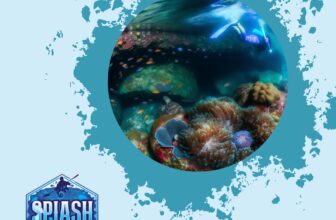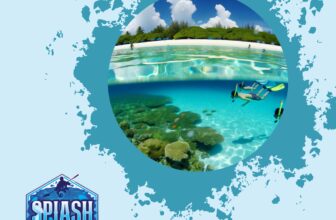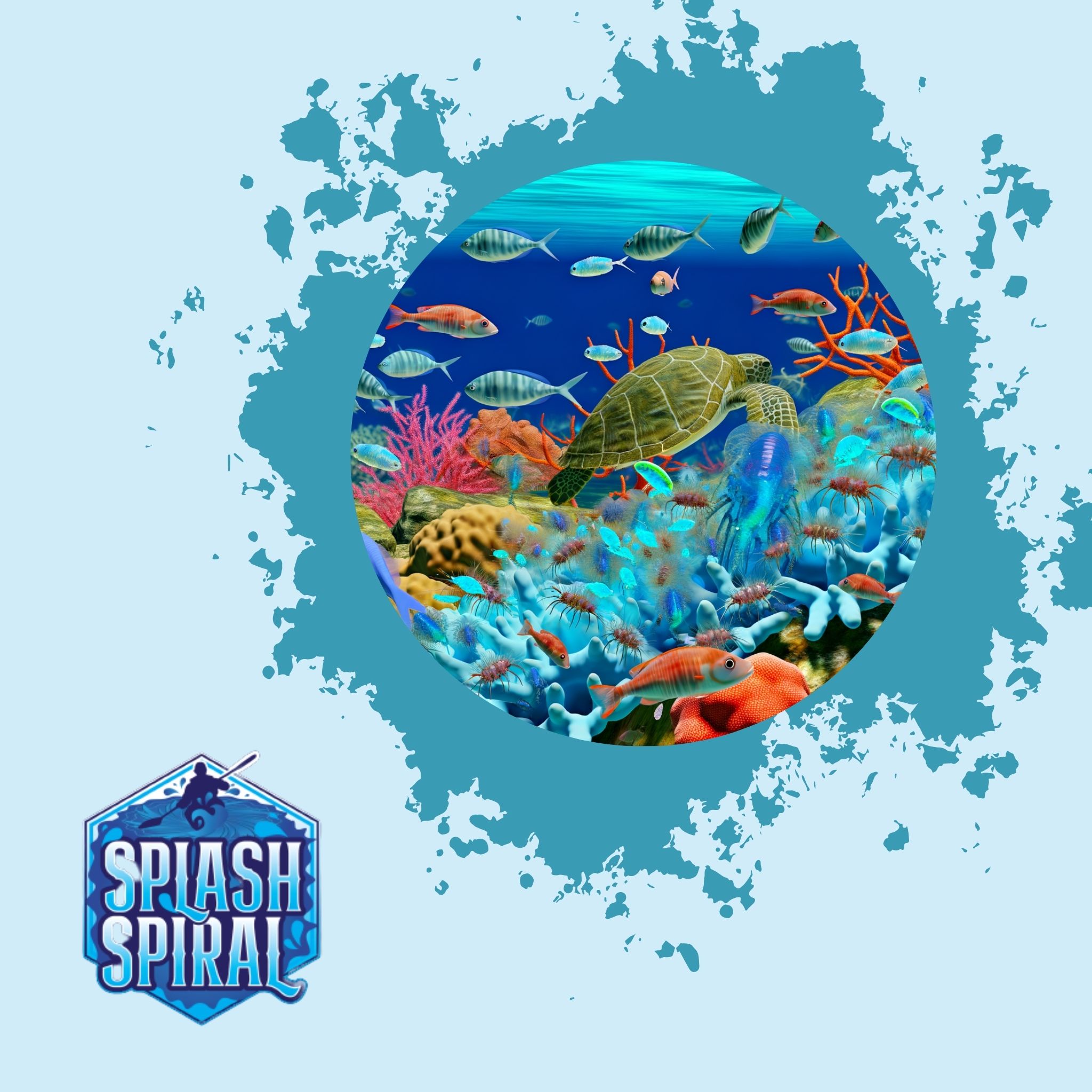
Understanding the dynamics of marine ecosystems is crucial for divers, marine biologists, and conservationists alike. Marine parasites, often overlooked, play an essential role in maintaining ecosystem health. Far from being merely destructive pests, these organisms contribute to underwater biodiversity and help perform vital ecosystem functions.
Introduction
Marine parasite ecology might sound like something that only a marine biologist or a seasoned researcher would dive into, but understanding it can be incredibly beneficial for anyone interested in the underwater world, especially beginner divers. In simple terms, marine parasite ecology involves studying parasites that live in marine environments and how they interact with their hosts and ecosystems.
These tiny organisms, although often seen as unwelcome guests, actually help maintain the natural balance of marine ecosystems. They play crucial roles such as controlling host populations, recycling nutrients, and even serving as indicators of environmental health. In other words, marine parasites are far from being mere pests; they are an essential part of the underwater world we seek to explore and enjoy.
This knowledge can significantly enhance your diving experience. Knowing what to look for and understanding the relationships between marine life forms can add a whole new layer of appreciation to your underwater adventures. So, let’s dive right in and explore what makes these seemingly insignificant creatures so important!
What Are Marine Parasites?
Alright, let’s break down the concept of marine parasites, especially if you’re just getting started in diving or the world of marine biology. Think of marine parasites as guests that live in or on other marine organisms, which we call hosts. Some of these guests are uninvited and can even cause harm, but they're part of an intricate web of life under the sea.
Basic Definition and Classifications
Marine parasites are organisms that rely on other marine creatures for survival, often at the expense of their hosts. While the term “parasite” might make you think of pesky invaders, these organisms are a critical part of marine ecosystems. They come in all shapes and sizes and can be found in nearly every habitat from coral reefs to the deep sea.
Parasites typically fall into three basic categories:
- Ectoparasites: These live on the surface of their host, like sea lice on fish.
- Endoparasites: These live inside their host, like nematode worms in the guts of marine animals.
- Mesoparasites: These can live partially inside and partially outside their host’s body.
Common Types of Marine Parasites
When talking about marine parasites, you’ll often come across a few key players:
- Isopods: These are crustaceans that can latch onto fish and other marine creatures. Some isopods are infamous for replacing the tongues of fish, which is as creepy as it sounds!
- Trematodes (Flukes): These are flatworms that usually make their home inside the bodies of hosts like mollusks and fish. They have complex life cycles often involving multiple hosts.
- Nematodes: These roundworms can be found in a variety of marine animals, from fish to marine mammals.
- Copepods: Tiny but mighty, these crustaceans often attach to fish and invertebrates, feeding off their bodily fluids.
- Parasitic Barnacles: Not your typical barnacle, these guys actually burrow into their crab hosts, impacting their reproduction.
Knowing about these common marine parasites will help you recognize the small but significant roles they play in the underwater world. Understanding them not only enriches your diving experience but also enhances your appreciation for the delicate balance required to keep marine ecosystems thriving. So, next time you dive, keep an eye out for these tiny but fascinating creatures, and remember: they’re part of the big underwater picture.
The Role of Marine Parasites in Ecosystem Health
Marine parasites aren’t just creepy crawlies that burden their hosts; they’re intricate players in the underwater world, maintaining ecosystem balance in ways that are both fascinating and vital. Though it might seem counterintuitive, these small organisms perform big roles that keep our oceans in check.
Ecosystem Balance
Marine parasites help regulate host populations, preventing any one species from dominating the ecosystem and causing imbalance. By infecting certain fish, parasitic isopods, for example, can control fish populations, aiding in the prevention of overgrazing on algae and other marine vegetation. This control acts as a natural population check, maintaining biodiversity.
Complexity in Parasitic Relationships
Parasitic relationships in marine environments are complex and diverse. Unlike predator-prey dynamics, these relationships often involve intricate life cycles that can span multiple hosts and stages. For instance, some trematodes go through snails and fish before reaching their final host in seabirds. This complexity ensures that multiple species interact in a balanced dance, further contributing to ecosystem stability.
Impact on Underwater Biodiversity
Marine parasites impact biodiversity by creating niches that wouldn't otherwise exist. They foster an environment where different species can coexist by limiting the overabundance of any single species. This promotes a healthier, more resilient ecosystem. Fish with parasites might be slower, making them easier prey—thereby sustaining predator populations and supporting a balanced food web.
Understanding this role of marine parasites in ecosystem health brings a new appreciation for these underrated organisms. Next time you dive, keep an eye out for these fascinating creatures; they are the unsung heroes of the underwater world, maintaining the delicate balance of life beneath the waves.
Parasitic Relationships: Case Studies
Understanding marine parasites becomes much clearer when looking at real-life examples. Below are a few case studies that highlight parasitic relationships commonly found in marine environments.
Fish and Parasitic Isopods
Ever notice a lumpy spot on a fish? That could be a parasitic isopod. These small crustaceans attach themselves to fish and feed on their blood or flesh. While this may sound grotesque, the interaction is complex. Some isopods even help their host by removing excess mucus and dead tissue, which can prevent infections.
Mollusks and Trematodes
Trematodes, or flukes, are another fascinating group of marine parasites. They have a multi-phase lifecycle often involving mollusks as intermediate hosts. A single mollusk can host numerous trematodes, which might seem like a burden. Yet, this relationship often keeps the mollusk populations in check, maintaining balance in the ecosystem.
Crustaceans and Parasitic Barnacles
Imagine having another creature living inside you. That's the reality for many crabs that fall victim to parasitic barnacles. The barnacle larvae inject themselves into the crab, growing and eventually taking control of the crab's reproductive system. Though it sounds grim, this relationship can limit crab populations, preventing them from overwhelming their habitats.
By exploring these specific cases, beginners can get a tangible sense of how parasitic relationships operate in the marine world. These examples also demonstrate the delicate balance maintained by these interactions, contributing to the overall health of underwater ecosystems. When you're diving next, keep an eye out—you might spot these intricate relationships in action.
The Environmental Impact of Marine Parasites
Let's dive right into the nitty-gritty: marine parasites can shake things up underwater. They might be tiny, but the presence of parasites can have a huge ripple effect on marine population dynamics. Imagine a fish population suddenly spiked with parasitic isopods. These little hitchhikers can cause fish to become weaker, making them easy prey for predators and thereby shifting the balance in the local food web. It's like pulling a thread from a finely-knit sweater—the whole thing can start to unravel.
But it’s not all underwater chaos. There can be some pretty gnarly downsides for commercial fisheries, too. When parasites hit species that are fished for food, the economic implications can be serious. Infected fish might not make it to market, and this can lead to reduced catches and financial loss for fishers. For example, trematode infestations in shellfish can render them unsuitable for sale, affecting both supply and demand.
Then there's the larger picture: underwater ecosystems are deeply interconnected. When the balance of parasitic presence is thrown off—whether through pollution, climate change, or overfishing—the entire marine environment can suffer. Coral reefs, seagrass beds, and other critical habitats might degrade if key species are overly parasitised, disrupting the intricate balance that keeps these ecosystems humming.
So, while parasites might seem like unwelcome guests, they actually play crucial roles. When their balance is disrupted, it’s like throwing a wrench into a well-oiled machine. For all you beginner divers out there, understanding this can add another layer of appreciation for the underwater world. The next time you see a fish with a tiny "tagalong," you'll know there's a complex story unfolding—one that's essential for the health of our oceans.
The Positive Contributions of Marine Parasites
Marine parasites often get a bad rap, but these pint-sized creatures actually bring several benefits to their underwater communities. Let's break down some of the positive contributions these parasites make to marine ecosystems.
First off, parasites play a critical role in controlling host populations. For example, if a fish population grows too large, parasites can help curb their numbers, preventing overpopulation and the issues that come with it. By keeping host populations in check, parasites contribute to a balanced ecosystem where no single species dominates the underwater landscape.
Parasites also contribute to nutrient cycling, an essential process for ecosystem health. When parasites infect a host, they often cause their host to be consumed by predators sooner than they naturally would. This accelerates the transfer of nutrients through the food web, providing essential nourishment to various marine organisms. It's a bit of an eco-friendly recycling program happening below the waves!
Lastly, parasites can serve as indicators of environmental health. Much like how the presence of certain tree species can indicate soil quality on land, the types and quantities of marine parasites can reveal a lot about the underwater environment. Scientists often study these organisms to gauge the health of an ecosystem. If parasite populations are out of whack, it can signal underlying issues that need attention.
So, next time you hear about marine parasites, remember they're not just pesky freeloaders. They're important players in the aquatic world, helping to maintain the balanced and dynamic ecosystems that divers cherish. Understanding their roles can add a new layer of appreciation to your diving adventures.
Importance for Divers
As a beginner diver, you might be wondering why you should care about marine parasites. The truth is, understanding marine parasite ecology can significantly enhance your diving experiences in multiple ways.
Firstly, being aware of marine parasites adds a layer of fascination to your underwater explorations. It’s one thing to admire the vibrant coral reefs and swaying kelp forests, but recognizing the tiny organisms playing crucial roles in these environments will make your dives much richer. You'll begin to see beyond the obvious and appreciate the intricate web of life beneath the surface. For example, knowing that certain fish have symbiotic relationships with cleaner organisms can make spotting a cleaner wrasse station during a dive a lot more intriguing.
Secondly, understanding parasitic relationships helps you appreciate the complexities of marine life. When you see a fish hosting parasitic isopods, you're witnessing a delicate balance that contributes to the health and control of marine populations. This knowledge makes your diving experience more educational and engaging, transforming you from a passive observer into an informed participant.
Lastly, knowing how to identify marine parasites can be a practical skill. While diving, you might come across unusual behavior or abnormalities in marine creatures. Recognizing that a fish is carrying parasites rather than being injured or sick can help you better understand what's really happening in the underwater environment. This can be particularly useful for divers interested in underwater photography or those keen on contributing to citizen science projects.
Here are a few tips for observing and identifying marine parasites while diving:
- Be Observant: Instead of just swimming through, take your time to look closely at fish, mollusks, and other marine creatures. Watch for odd attachments or unusual behaviors.
- Use Guides: Bring a marine species guidebook with you or use an underwater slate to jot down observations. Many guidebooks include information on common parasites.
- Take Photos: If you have an underwater camera, take close-up shots of anything unusual. You can compare these with reference images later or seek expert identifications online.
- Join Groups: There are numerous diving clubs and online forums where you can share experiences and learn from more seasoned divers. You might even find buddy divers with a keen interest in marine parasites.
Arming yourself with this knowledge not only makes your diving ventures more enriching but also helps foster a deeper respect for the underwater world. So, next time you don your gear, remember to keep an eye out for the small stuff. The tiniest organisms often have the most significant stories to tell.
Contemporary Research and Conservation Efforts
Diving into the latest discoveries in marine parasite ecology reveals a fascinating blend of science and conservation. Researchers are uncovering how these tiny hitchhikers can impact, and sometimes stabilize, entire marine ecosystems. Dive in with us to explore some cutting-edge trends and efforts ensuring a balanced presence of parasites underwater.
Benefits of Parasites in Marine Environments
A lot of recent research focuses on the surprising benefits parasites bring to marine environments. For example:
- Regulation of Host Populations: Parasites help regulate host population sizes, preventing any single species from becoming too dominant.
- Biodiversity Maintenance: This balance maintains biodiversity, which is essential for a healthy ecosystem.
As a beginner diver, understanding these dynamics can make your dives even more meaningful.
Conservation Efforts
On the conservation front, efforts are arising to protect not just the charismatic megafauna like dolphins and sea turtles but also the less glamorous, yet equally important, marine parasites. Key initiatives include:
- Preservation of Host Species: By preserving host species, conservationists also ensure the survival of their parasites.
- Stability of Marine Food Web: This approach helps in maintaining the stability of the entire marine food web.
Research and Citizen Science
In labs and field stations worldwide, researchers are developing methods to track parasite health and population trends. These studies provide valuable insights into the general health of marine ecosystems.
As a diver, you could act as a citizen scientist, contributing to these studies by observing and reporting your underwater parasite encounters.
Importance of Protecting Parasites
Protecting marine parasites and their hosts might sound odd, but it is crucial. Here's why:
- Natural Checks and Balances: Keeping these dynamics in place helps maintain the natural checks and balances in the ecosystem.
- Vibrant Oceans: By understanding and preserving these relationships, we help ensure the ocean remains a vibrant place for both seasoned explorers and beginner divers alike.
By diving into the world of marine parasites and participating in conservation efforts, you contribute to a more balanced and healthier marine ecosystem.
Conclusion
In summary, marine parasites are invaluable contributors to the health and stability of underwater ecosystems. Their complex relationships with hosts, roles in regulating populations, and involvement in nutrient cycling demonstrate that these small organisms are far more than mere pests.
Why Marine Parasites Matter
For beginner divers, gaining an understanding of marine parasite ecology can add a new layer of appreciation and curiosity to your diving experience. As you delve into the world of diving, consider the intricate web of life that includes not just the more celebrated marine animals but also the less conspicuous parasites that play vital roles.
Continued Learning
Continually educating yourself about these relationships will not only make your dives more interesting but will also deepen your respect for the marine environment as a whole.
Recommended Reading
For further reading and exploration on related topics, feel free to check out these articles:
- Bioluminescence in the Ocean: A Diver's Guide to Light-Producing Organisms
- Coastal Erosion: Impact on Marine Habitats and Dive Sites
- Scuba Diving
Embracing the importance of marine parasites will not only enrich your underwater journeys but will also foster a profound respect for the delicate balance that sustains the vibrant marine world.
Happy diving!



